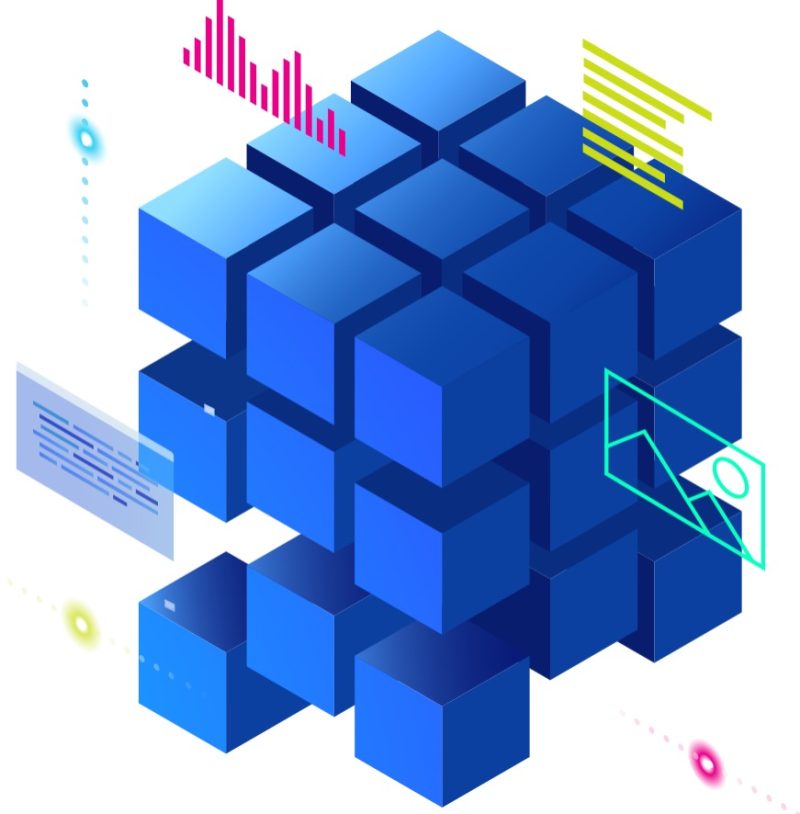AI courses - table of contents
Why is it worthwhile to learn with AI courses?
It may be obvious to you, but even if it is, it bears repeating: today, artificial intelligence is no longer a futuristic concept but a reality that is shaping the job market. Learning AI is an investment in your future, both personally and professionally. Here are three key reasons to pursue and explore AI courses:
- Adaptability to rapid changes in technology – AI is driving innovation in many industries, from medicine to finance, and its importance is predicted to grow. In the financial sector, for example, AI is helping to detect fraud and optimize risk management,
- Essential skills for the future of work– automation and AI are changing the way we work, and understanding these technologies is becoming critical for every employee and manager. In large-scale manufacturing, robots working alongside humans (cobots) are already commonplace, and operating them requires new skills,
- Potential for significant productivity gains – generative AI, when used properly, can increase productivity, which translates into better business results. A great example is the use of AI in marketing to personalize offers and communications with customers.
So it’s clear as day that AI courses are an opportunity to grow and gain an edge in a job market that is constantly changing.
What AI courses are worth taking?
Choosing the right AI course can be career-changing. Here are some recommended programs that stand out in the educational marketplace and are highly regarded by professionals.
IBM Applied AI Professional Certificate from Coursera
Coursera offers more than 800 AI courses and more than 25 courses and projects in generative AI. One of these, offered by Coursera in partnership with IBM (https://www.coursera.org/professional-certificates/applied-artifical-intelligence-ibm-watson-ai), provides a thorough and very comprehensive introduction to artificial intelligence. The course discusses:
- Programming in Python – ubiquitous in the field of artificial intelligence,
- Creating chatbots – which can contribute to more effective customer service but also to easier communication with the company’s internal knowledge base,
- Machine learning – refers to the various methods through which AI can acquire information about your company,
- Image recognition – using IBM Watson.
Students in this AI course also gain skills in artificial intelligence, data science, machine learning, deep learning, Watson AI, and large language models. A 7-day free trial and financial aid are offered to make the AI course accessible to a broader audience. This is reflected in the enrollment numbers, with 7,850 individuals choosing to embark on their learning journey.
AI for Everyone from DeepLearning.AI
AI course for Everyone from DeepLearning (https://www.deeplearning.ai/courses/ai-for-everyone/) is addressed to non-technical individuals, including entrepreneurs, managers, and specialists, who wish to enhance their skills to better perform their daily tasks.
This wonderful resource allows you to understand AI technologies, learn about their applicability, and understand AI’s impact on society. It includes detailed information on the workflow of machine learning projects, an explanation of AI terminology, AI strategies, and how a typical data science project goes.
The AI course is designed for non-technical business professionals and machine learning engineers who want to explain AI capabilities to their managers in an accessible way. This course is free and provides an excellent introduction to the world of AI.
Generative AI for Everyone
Generative AI for Everyone (https://www.deeplearning.ai/courses/generative-ai-for-everyone/) teaches how generative artificial intelligence works, its applications and the impact it can have on business and society. Participants will gain skills in the following areas:
- practical use of generative AI tools,
- AI strategy for work and business
- AI productivity, and
- AI capabilities beyond creating simple prompts.
It is designed for business leaders, professionals, and anyone interested. No programming skills or prior knowledge of AI is required.

Source: DeepLearning.ai (https://www.deeplearning.ai/courses/generative-ai-for-everyone/)
AI for Good, or sustainable AI development
AI for Good (https://www.deeplearning.ai/courses/ai-for-good/) focuses on the role of AI in solving complex challenges, combining human and machine intelligence to positively impact the world.
The course provides skills related to frameworks for projects conducted by AI for Good, which include:
- Supervised Learning,
- Computer Vision,
- Natural Language Processing, and
- Exploratory data analysis.
It includes projects on topics like public health, climate change, and emergency management, and is open to anyone with experience working with data.
Introduction to AI from Google
Google’s Introduction to Generative AI (https://www.cloudskillsboost.google/paths/118 ) is an AI course that explains what generative AI is, its applications, and how it differs from traditional machine learning. The AI course covers several parts. They include, among others:
- Google tools – used for developing generative AI applications,
- Introduction to large language models – what LLMs are, cases of their usage, and fine-tuning prompts to enhance LLM performance,
- Introduction to responsible AI – emphasizes the importance of responsible AI and presents Google’s 7 AI principles.
The introductory AI course from Google mainly focuses on fundamental concepts and responsible implementation.

Source: DALL·E 3, prompt: Marta M. Kania (https://www.linkedin.com/in/martamatyldakania/)
AI for beginners from Microsoft
AI for beginners from Microsoft (https://microsoft.github.io/AI-For-Beginners/) is a 12-week teaching program comprising 24 lessons that cover various approaches to AI, including symbolic AI, neural networks, computer vision, NLP, and other methodologies.
The teaching program includes practical lessons, quizzes, and labs, and covers TensorFlow, PyTorch, as well as the principles of AI ethics. The AI course offers 12 lessons on topics such as:
- writing prompts – creating commands for generative artificial intelligence,
- prompt engineering – advanced principles of prompt creation, enabling AI to generate complex outputs and reason in the way we need,
- creating AI applications – using AI itself.
What AI certifications count in business?
AI certificates serve as indicators of acquired skills and knowledge, opening doors to new professional opportunities. Therefore, it is worthwhile to invest in courses that offer certified completion of the training.
Coursera is a reputable platform offering certificates from top global universities. Consider local courses too, but be cautious and check the qualifications of instructors, as AI is sometimes taught by individuals without the proper credentials.
The role of CLO in a company implementing AI
Learning and implementing AI in a company goes beyond taking AI courses. Small businesses may find hiring external experts expensive, so some choose to appoint a Chief Learning Officer (CLO) to manage learning processes internally.
The chief learning officer (CLO) plays a key role in guiding teams and organizations through the opportunities presented by learning new technologies like AI. Their duties include evaluating employees’ skills and capabilities and strategically choosing courses for skill expansion. This helps the organization to grow effectively.
Summary. AI courses for business
AI education is booming, with a 157% year-over-year increase in enrollments for generative AI courses on Coursera. Users on Coursera for Business searched for terms like “AI,” “ChatGPT,” and “generative AI” 445% more frequently year over year. The course “Generative AI with Large Language Models” by DeepLearning.AI + AWS is one of the most popular courses in terms of enrollments within the first 30 days on Coursera.
We believe the above data speaks for itself. Choosing the right AI course can be crucial for your professional development and the success of your company. Therefore, it’s worth taking the time to delve into this fascinating field and acquire skills that will not only help you survive but also thrive in the future, where skills will be significantly influenced by AI.

If you like our content, join our busy bees community on Facebook, Twitter, LinkedIn, Instagram, YouTube, Pinterest, TikTok.
Author: Robert Whitney
JavaScript expert and instructor who coaches IT departments. His main goal is to up-level team productivity by teaching others how to effectively cooperate while coding.
AI in business:
- Threats and opportunities of AI in business (part 1)
- Threats and opportunities of AI in business (part 2)
- AI applications in business - overview
- AI-assisted text chatbots
- Business NLP today and tomorrow
- The role of AI in business decision-making
- Scheduling social media posts. How can AI help?
- Automated social media posts
- New services and products operating with AI
- What are the weaknesses of my business idea? A brainstorming session with ChatGPT
- Using ChatGPT in business
- Synthetic actors. Top 3 AI video generators
- 3 useful AI graphic design tools. Generative AI in business
- 3 awesome AI writers you must try out today
- Exploring the power of AI in music creation
- Navigating new business opportunities with ChatGPT-4
- AI tools for the manager
- 6 awesome ChatGTP plugins that will make your life easier
- 3 grafików AI. Generatywna sztuczna inteligencja dla biznesu
- What is the future of AI according to McKinsey Global Institute?
- Artificial intelligence in business - Introduction
- What is NLP, or natural language processing in business
- Automatic document processing
- Google Translate vs DeepL. 5 applications of machine translation for business
- The operation and business applications of voicebots
- Virtual assistant technology, or how to talk to AI?
- What is Business Intelligence?
- Will artificial intelligence replace business analysts?
- How can artificial intelligence help with BPM?
- AI and social media – what do they say about us?
- Artificial intelligence in content management
- Creative AI of today and tomorrow
- Multimodal AI and its applications in business
- New interactions. How is AI changing the way we operate devices?
- RPA and APIs in a digital company
- The future job market and upcoming professions
- AI in EdTech. 3 examples of companies that used the potential of artificial intelligence
- Artificial intelligence and the environment. 3 AI solutions to help you build a sustainable business
- AI content detectors. Are they worth it?
- ChatGPT vs Bard vs Bing. Which AI chatbot is leading the race?
- Is chatbot AI a competitor to Google search?
- Effective ChatGPT Prompts for HR and Recruitment
- Prompt engineering. What does a prompt engineer do?
- AI Mockup generator. Top 4 tools
- AI and what else? Top technology trends for business in 2024
- AI and business ethics. Why you should invest in ethical solutions
- Meta AI. What should you know about Facebook and Instagram's AI-supported features?
- AI regulation. What do you need to know as an entrepreneur?
- 5 new uses of AI in business
- AI products and projects - how are they different from others?
- AI-assisted process automation. Where to start?
- How do you match an AI solution to a business problem?
- AI as an expert on your team
- AI team vs. division of roles
- How to choose a career field in AI?
- Is it always worth it to add artificial intelligence to the product development process?
- AI in HR: How recruitment automation affects HR and team development
- 6 most interesting AI tools in 2023
- 6 biggest business mishaps caused by AI
- What is the company's AI maturity analysis?
- AI for B2B personalization
- ChatGPT use cases. 18 examples of how to improve your business with ChatGPT in 2024
- Microlearning. A quick way to get new skills
- The most interesting AI implementations in companies in 2024
- What do artificial intelligence specialists do?
- What challenges does the AI project bring?
- Top 8 AI tools for business in 2024
- AI in CRM. What does AI change in CRM tools?
- The UE AI Act. How does Europe regulate the use of artificial intelligence
- Sora. How will realistic videos from OpenAI change business?
- Top 7 AI website builders
- No-code tools and AI innovations
- How much does using AI increase the productivity of your team?
- How to use ChatGTP for market research?
- How to broaden the reach of your AI marketing campaign?
- "We are all developers". How can citizen developers help your company?
- AI in transportation and logistics
- What business pain points can AI fix?
- Artificial intelligence in the media
- AI in banking and finance. Stripe, Monzo, and Grab
- AI in the travel industry
- How AI is fostering the birth of new technologies
- The revolution of AI in social media
- AI in e-commerce. Overview of global leaders
- Top 4 AI image creation tools
- Top 5 AI tools for data analysis
- AI strategy in your company - how to build it?
- Best AI courses – 6 awesome recommendations
- Optimizing social media listening with AI tools
- IoT + AI, or how to reduce energy costs in a company
- AI in logistics. 5 best tools
- GPT Store – an overview of the most interesting GPTs for business
- LLM, GPT, RAG... What do AI acronyms mean?
- AI robots – the future or present of business?
- What is the cost of implementing AI in a company?
- How can AI help in a freelancer’s career?
- Automating work and increasing productivity. A guide to AI for freelancers
- AI for startups – best tools
- Building a website with AI
- OpenAI, Midjourney, Anthropic, Hugging Face. Who is who in the world of AI?
- Eleven Labs and what else? The most promising AI startups
- Synthetic data and its importance for the development of your business
- Top AI search engines. Where to look for AI tools?
- Video AI. The latest AI video generators
- AI for managers. How AI can make your job easier
- What’s new in Google Gemini? Everything you need to know
- AI in Poland. Companies, meetings, and conferences
- AI calendar. How to optimize your time in a company?
- AI and the future of work. How to prepare your business for change?
- AI voice cloning for business. How to create personalized voice messages with AI?
- Fact-checking and AI hallucinations
- AI in recruitment – developing recruitment materials step-by-step
- Midjourney v6. Innovations in AI image generation
- AI in SMEs. How can SMEs compete with giants using AI?
- How is AI changing influencer marketing?
- Is AI really a threat to developers? Devin and Microsoft AutoDev
- AI chatbots for e-commerce. Case studies
- Best AI chatbots for ecommerce. Platforms
- How to stay on top of what's going on in the AI world?
- Taming AI. How to take the first steps to apply AI in your business?
- Perplexity, Bing Copilot, or You.com? Comparing AI search engines
- ReALM. A groundbreaking language model from Apple?
- AI experts in Poland
- Google Genie — a generative AI model that creates fully interactive worlds from images
- Automation or augmentation? Two approaches to AI in a company
- LLMOps, or how to effectively manage language models in an organization
- AI video generation. New horizons in video content production for businesses
- Best AI transcription tools. How to transform long recordings into concise summaries?
- Sentiment analysis with AI. How does it help drive change in business?
- The role of AI in content moderation


















